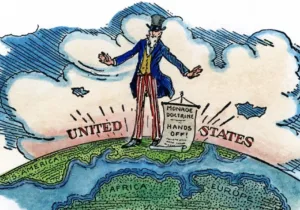On December 11th, 1941, America entered the inferno. Despite the savage attack four days earlier by Imperial Japan, a member of the Tripartite Pact that included Germany and Italy, Roosevelt remained convinced that it was Hitler who posed the greatest threat to Western civilization. Nevertheless, he also believed Americans, still war-weary from the conflagrations of the first Great War and in little mood for more, would never countenance war in Europe because of an attack, however terrible, in the Pacific. Thus, at the start of this day 74 year ago, the United States was at war only with Japan.
Hitler saw fit to change all that. Inexplicably to many, even as the German front was breaking at Moscow and Army Group Center – the Schwerpunkt, or center of gravity of the German fight in the east – was on the verge of collapse, Hitler declared war against America. Whether a decision born of incompetence, insanity, or arrogant disregard for the strength of the United States, that declaration changed the world forever – not least by helping finalize the United States’ own redefinition of its sense of responsibility in it.
As Providence embarks upon its endeavor to provide conceptual resources, both theologically faithful and practically efficacious, to help shape the character and expression of American responsibility abroad, I am reminded of Albert Camus’ imaginary correspondence to a “German friend” in which he distinguishes important differences between how he views his nation and its role in the world and the view of his Teutonic interlocutor.
Letters to a German Friend was written during the German occupation of France when things were still very much undecided. They were written, in Camus’ words, “to throw some light on the blind battle we were waging.” Camus understood that by clarifying some of the terms of the fight, it could be made more effective. One finds much in these letters to commend to the contemporary situation. As nations, as ideologies or philosophies of life, continue to contend one against the other, Camus’ words provide both grounding for that fight as well as admonitions that wisely limit the means by which we wage it, however justified our ends.
While the whole of the Letters ought to be read by everyone; here I touch briefly on just one or two phrases from the “First Letter.”
Camus writes:
“I have never believed in the power of truth in itself. But it is at least worth knowing that when expressed forcefully truth wins out over falsehood…We are fighting for fine distinctions, but the kind of distinctions that are as important as man himself. We are fighting for the distinction between sacrifice and mysticism, between energy and violence, between strength and cruelty, for that even finer distinction between the true and the false.”
In the first edition to appear outside of France following the liberation, Camus was careful to insist that Letters should not be understood to be a dialogue between just any Frenchman and just any German. Rather, they are deeply reliant on context: they are exchanges between a Nazi and a “free European” presently-under-siege. “I am contrasting two attitudes,” Camus notes, “not two nations, even if, at a certain moment in history, these two nations personified two enemy attitudes.” Today, other such fine distinctions could be cast alongside Camus’ including those between those terms – order, concern, community, justice, responsibility, and love – that support liberalism and work toward the welfare of all, including the powerless, and those contrary terms – disorder, atomization, solipsism, injustice, desertion, and indifference – that yield in the desiccation of liberalism and the annihilation of the powerless.
Presuming to align oneself with one set of terms against the other need not be arrogance. Camus’ insisted that fine distinctions must necessarily qualify one’s own sense of national pride. Regarding the National Socialist project, Camus’ German friend insisted, “The greatness of my country is beyond price. Anything is good that contributes to its greatness.” Against such sentiment Camus contended:
“I love you, but at that point we diverge. No…I cannot believe that everything must be subordinated to a single end. There are means that cannot be excused. And I should like to be able to love my country and still love justice. I don’t want just any greatness for it, particularly a greatness born of blood and falsehood.”
On this point, and many others, Christian realism is happily Camusian. Against those who claim that the cause at hand, or any cause, could be so important so as to trump all moral concerns, the Christian realist stands opposed. A part of the aim of Providence is to be clear, and winsome where we’re able, about this opposition. As in Camus’ day, such opposition is timely.
Nothing ever really changes much: the same illiberal ideologies that sought to dominate all others in the fanaticism of the 20th Century – or to destroy those who would not be dominated – is evident today in various manifestations. Some appear to be more or less seamless continuities: as is the totalizing ideological terrorism-backed-by-violence of ISIS and Al Qaeda. Other manifestations are analogous by conceptual similarity and intensity – even if the violence they enact is of the non-lethal variety. Here I am thinking of those campus hordes who have taken both legitimate and imagined grievances and turned them into excuses to utilize, like Camus’ friend, whatever means necessary to enact their utopian hallucinations of the ideal society. Both groups justify their means by gesturing to the utter necessity of their cause.
Against those who do not share their passion or its intensity , such as these might echo the German friend’s accusation against Camus: “Well, you don’t love your country [or your cause].” But Camus, still making fine distinctions, makes a critical counterclaim:
“No, I don’t love my country, if pointing out what is unjust in what we love amounts to not loving, if insisting that what we love should measure up to the finest image we have of her amounts to not loving…This country is worthy of the difficult and demanding love that is mine. And I believe she is decidedly worth fighting for since she is worthy of a higher love.”
Compared to that love of country or of cause that is willing to discipline that country or cause by what it is true, beautiful, and good, the fanatic’s love of cause is a tawdry imitation of love. Such imitations Camus concludes, have “received from its sons only the love it deserved, which was blind. A nation is not justified by such love. That will be your undoing.” It is not utterly sentimental to believe that truth, beauty, and goodness will win in the end. If nothing else, we have been promised it will.
As we prosecute wars and ideological battles today, then, just as we strove to prosecute that fight that began 74 years ago, we must be disciplined by love, not tawdry imitations, and we must be committed to fighting for fine distinctions, even when they stay our hand and rebuke our own activities.
Marc LiVecche, PhD, University of Chicago, is Scholar on Christian Ethics, War, & Peace and managing editor of Providence
Photo: Adolf Hitler delivers a speech at the Kroll Opera House to the men of the Reichstag on the subject of Roosevelt and the war in the Pacific, declaring war on the United States. wikipedia commons.






